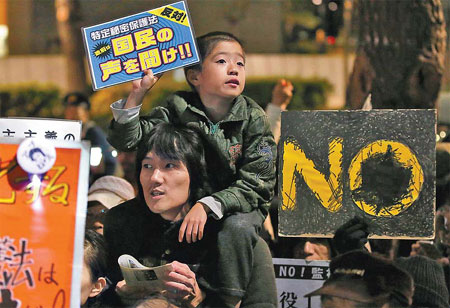Tokyo may expand air defense zone
Move part of establishment of Japanese national security council
When Japan establishes its national security council, scheduled for next week, it is considering expanding its air defense identification zone in the Pacific Ocean, Japan's top-selling newspaper Yomiuri Shimbun reported on Wednesday. Its Defense Ministry is also mulling stationing fighter jets at bases in the area, the report added.
Japanese Chief Cabinet Secretary Yoshihide Suga was reported as saying on Thursday that Japanese fighter planes intruded into China's newly announced ADIZ on Thursday without informing China in advance.
The new council, planned as a headquarters for Japan's foreign and security policies, will report directly to the office of Japanese Prime Minister Shinzo Abe.
The council will be made up of the prime minister, the chief cabinet secretary and the foreign and defense ministers.
The council will convene a meeting of the prime minister and three key Cabinet members approximately every two weeks to discuss national security issues and lay down basic principles on how to deal with key problems.
Tokyo expects the council will address such issues as the Democratic People's Republic of Korea's nuclear issue, relations with China and matters related to Japan's territory.
A national security bureau is to be established as the council's executive office by the end of January. The office will collate information gathered by government branches and provided by foreign governments. Shotaro Yachi, senior adviser to the Cabinet secretariat, is expected to be named the first director-general of the bureau.
A special adviser to the prime minister will be appointed to be in charge of national security issues. The position is likely to be assumed by Yosuke Isozaki, an aide to the prime minister.
Abe has laid out his case for a centralized council to serve as a "control tower" in light of the shifting security environment in Northeast Asia. A draft outline of Japan's new defense guidelines to be unveiled next month said Japan needs to enhance its military surveillance capabilities at a time when China is showing increased assertiveness, according to Japan's Kyodo News Agency.
It also mentioned Japan's military needs to bolster its ability to defend "remote islands". Japan's Defense Ministry has already said it was considering buying unmanned surveillance drones.
When addressing the council's advisory board in May, Abe said, "The establishment of the national security council will be the first step toward a great turning point in the history of foreign and security issues in Japan."
On Tuesday, Japan's lower house passed the secrets protection bill. The upper house is deliberating over it before taking a vote. The Abe administration is expecting the bill will be passed into law at the current parliamentary session, as it considers the secrets protection bill inseparable from the council.
Establishing the council would allow Abe to test the political waters on his greater goals of constitutional change - especially the contentious Article 9 which renounces Japan's right to retain military forces - and his political will to deal with Japan's neighboring countries, experts said.
Wang Xinsheng, a professor of Japanese studies at Peking University, said the council was one of Abe's main goals after he started his first term as prime minister in 2006.
"It reflects Japan's concern over China - the council is designed to contain China, which is regarded as a main regional competitor," Wang said, adding that territorial disputes, especially the Diaoyu Islands issue, will be the "core topic" for the council.
Liu Junhong, a researcher on Japan studies at the China Institute of Contemporary International Relations, said forming the council is a major step in Japan's drive to expand its military power.
"The council's mechanism gives too much power to Abe in setting national security policies, which worries many Japanese and the international community," said Liu, who was formerly a visiting researcher at Waseda University in Japan.
Zhang Fan in Beijing contributed to this story.
caihong@chinadaily.com.cn
|
Protesters gather in front of the parliament building in Tokyo on Tuesday after the government-proposed state secrecy bill was passed by the lower house. Japan moved closer toward a law that would expand the definition of state secrets. Toru Hanai / Reuters |
(China Daily 11/29/2013 page10)









